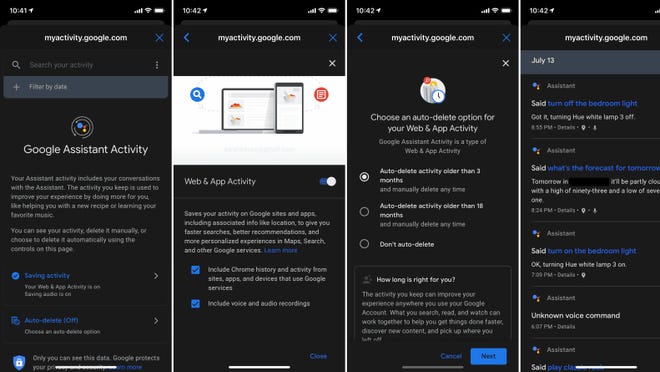Ford, Google cloud computing deal promises car tech upgrades
Ford Motor Co. and Google introduced a strategic partnership on Monday that is meant to extra shortly modernize the 117-year-old automaker in distinctive methods and extra aggressively use information to drive income and enhance buyer expertise.
Ford will begin exploring this yr using expertise to offer oversight and high quality management of manufacturing unit robotics in addition to further coaching of United Auto Workers members on the plant flooring, whereas Ford and Lincoln clients will begin seeing new driver experiences within the 2023 calendar yr.
What does this all imply? Ford and Lincoln drivers can have entry to voice expertise, like Google Assistant, permitting them to preserve their eyes on the highway and fingers on the wheel whereas multitasking. And Google Maps affords data on real-time site visitors, automated rerouting and lane steering. With Google Play, drivers might entry apps for listening to personalised music, podcasts and audiobooks within the automobile.
‘This is life-changing’:Meet the Redditors behind the GameStop saga
This new Cadillac tops 200 mph:GM debuts 2022 Cadillac CT4-V Blackwing and CT5-V Blackwing
Thomas Kurian, Google Cloud CEO, and David McClelland, Ford vice chairman of Strategy and Partnerships, revealed the main points in a digital information convention. The effort is supposed to reinforce driver enjoyment and security by connectivity.
This six-year collaboration involving Ford and Lincoln merchandise globally is designed to “elevate the automotive industry and reinvent connected vehicle customer experiences,” Ford stated.

The Dearborn, Michigan-based automaker has named Google Cloud its supplier for information, synthetic intelligence and machine studying administration. Millions of autos can be powered by Android with Google apps and providers inbuilt, Ford stated in its launch.
The firm has created Team Upshift to “drive the ongoing innovation” and “push the boundaries of Ford’s transformation, unlock personalized consumer experiences, and drive disruptive, data-driven opportunities.”

Jim Farley, CEO of Ford, stated in a information launch, “As Ford continues the most profound transformation in our history with electrification, connectivity and self-driving, Google and Ford coming together establishes an innovation powerhouse truly able to deliver a superior experience for our customers and modernize our business.”
Silicon Valley recognizes the history of Ford.
“From the first moving assembly line to the latest driver-assist technology, Ford has set the pace of innovation for the automotive industry for nearly 120 years,” stated Sundar Pichai, CEO of Google and Alphabet, in an announcement. “We’re proud to partner to apply the best of Google’s AI, data analytics, compute and cloud platforms to help transform Ford’s business and build automotive technologies that keep people safe and connected on the road.”

With Google Cloud, Ford said the company plans to:
- Improve customer experience with technology and personalized services;
- Accelerate product development, manufacturing and supply chain management
- Speed up real-time customer notices for maintenance and other activity
Enhanced technology is intended to minimize driver distraction and provide vehicle improvements with over-the-air updates, now used by Tesla and a familiar process with cell phones.
‘Obsessed’
“Android within the car additionally allows Ford and third-party builders to construct apps that present a consistently enhancing and ever-more-personalized possession expertise,” Ford stated.
Farley said, “We are obsessed with creating must-have, distinctively Ford products and services. This integration will unleash our teams to innovate for Ford and Lincoln customers while seamlessly providing access to Google’s world-class apps and services.”
Crisis prevention
The future for all automakers involves partnerships with technology companies now because “information is king,” said Michelle Krebs, executive analyst for AutoTrader.
“This is the longer term,” she said. “This is about information assortment, storage and finally monetizing that information assortment.”
In addition, Krebs said, the value of using data analysis for logistics support can’t be overstated. During a period when the industry is being hampered by a shortage in semiconductor chips used in vehicles, analysts see the supply chain is fragile and more data can only help.
“Maybe it may be used to guard in opposition to doable breaks within the provide chain,” Krebs said. “This international chip scarcity is a critical factor.”
Follow Detroit Free Press reporter Phoebe Wall Howard on Twitter@phoebesaid.




